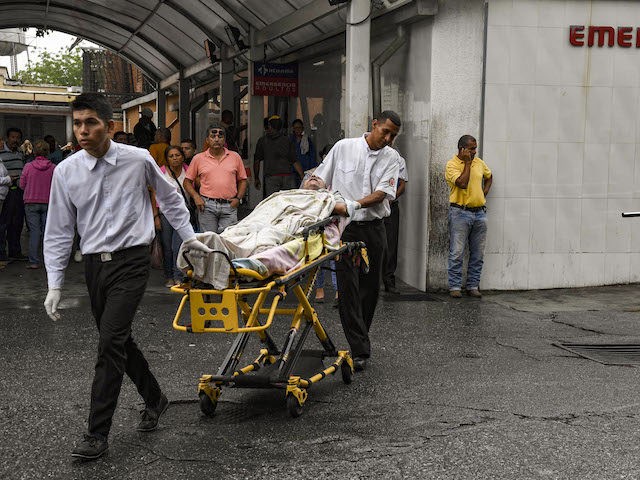The United Doctors of Venezuela, a non-governmental organization representing anti-socialist health workers, accused the socialist regime on Monday of fabricating its Chinese coronavirus statistics, which remain at press time suspiciously lower than those of its neighbors.
The regime of dictator Nicolás Maduro boasts one of the world’s worst healthcare systems, the product of two decades of socialist rule. While deteriorating under his predecessor Hugo Chávez, Venezuelan healthcare collapsed under Maduro. Nearly every medication on the World Health Organization’s (W.H.O.) list of drugs necessary to run a functional medical system has not been available in the country for years, forcing hospitals to ask patients to bring their own drugs if they have them. A lack of antibiotics, cleaning products, and other basic needs has resulted in skyrocketing rates of infant mortality and amputations due to infections. Venezuelans have protested the unnecessary loss of loved ones throughout Maduro’s tenure.
Despite this reality, Maduro’s regime claims to have documented only 243,621 cases of highly contagious Chinese coronavirus since the pandemic began in late 2019 and 2,734 deaths. In contrast, neighboring Colombia has documented 3.6 million cases and nearly 10,000 deaths. Brazil, which also shares a large border with Venezuela, has documented nearly 17 million coronavirus cases and 474,414 deaths attributed to the virus as of Tuesday.
Venezuelan doctors say the numbers are simply false.
“They manipulated the reality of the healthcare system. They manipulated the cases. They manipulated the hospitalizations. They manipulated the deaths,” a statement posted publicly on social media by the United Doctors of Venezuela on Monday read. “They are now manipulating the vaccination rates.”
The organization noted that the Maduro regime claims, despite having just begun its vaccination campaign on May 29, that 11 percent of Venezuelans have been vaccinated, a total that would represent about 3.3 million people. According to the Spanish newswire service EFE, Venezuela has only publicly announced the possession of 2.73 million doses of vaccines. Venezuela is relying on “Sputnik V,” a Russian-made vaccine product that has faced significant criticism for the minimal publicly available trial data on it, and on vaccine products made in China – all of which require at least two doses to reach full immunization potential.
The United Doctors group estimated the true vaccination rate was closer to 1.1 percent.
In addition to the discrepancy between the number of vaccine doses the Maduro regime is known to possess and the number of people it claims have been vaccinated, the health workers advocacy group accused the regime last week of doing a poor job of organizing vaccine distribution and prioritizing vulnerable people – especially the elderly – and emergency frontline workers. The Maduro regime revealed in May, following its deals for vaccines with China and Russia, that it would be using the “Fatherland Card” system to call citizens forward for their vaccines. The Fatherland system resembles China’s social credit system, which attributes a “score” to every citizen based on their loyalty to the communist regime, and was reportedly constructed by the Chinese telecommunications firm ZTE. Venezuelans need their Fatherland card for everything from medical care to buying food and gasoline; the use of the system for vaccines alarmed many who feared Maduro officials would use it to prioritize the politically connected for vaccination over the most vulnerable.
In an interview last week, the executive director of the United Doctors of Venezuela, Jaime Lorenzo, denounced the regime for putting vaccine distribution in the hands of senior socialist officials rather than medical experts, warning that most vaccines need special care like refrigeration.
“They don’t have the custody, from a sanitary point of view, to inform [the public] on this. That should go to the regional or national epidemiologists or someone in the health sector,” Lorenzo advised. “We are seeing crazy things, putting citizens directly at risk.”
“Vaccinating is not just injecting someone, it’s an entire logistical process that leads to administering it [the vaccine],” Lorenzo noted.
The Maduro regime’s omission of the nation’s medical community from its coronavirus response appears to extend beyond its vaccination efforts. The regime has not made clear exactly how it deems an individual officially diagnosed with Chinese coronavirus or the process through which they form part of official government statistics. A poll published in October by the Venezuelan firm Meganálisis suggested that the vast majority of those told by their doctors they have a coronavirus infection are not tabulated into official government statistics. Venezuelan officials count cases confirmed by polymerase chain reaction (PCR) tests, the most accurate form of confirmation available – but most Venezuelans have no access to these tests.
Among Venezuelans claiming to live with someone in their home diagnosed with coronavirus, 87 percent told Meganálisis in October that their housemate did not have access to a PCR test, meaning they did not form part of official statistics. That number increased to 89.4 percent in Meganálisis’ March poll.
In a survey taken in April, 82 percent of Venezuelans told Meganálisis they did not trust Venezuela’s official coronavirus statistics.

COMMENTS
Please let us know if you're having issues with commenting.